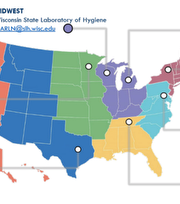You'll receive the latest updates on new standards, guidelines, and educational resources, as well as expert insights to help enhance your laboratory's performance and compliance.
Insights
Explore the latest developments in laboratory standards, guidelines, and best practices. Our expert perspectives and stories provide up-to-date information about what's new in laboratory testing.
All Insights
Filters
{{ sortLabels[option] }}
August 20, 2019
Learn about the treatment of newborns with Phenylketonuria, also called PKU, a rare inherited disorder.
Newborn Screening
August 14, 2019
Read how to implement a QMS in your laboratory to help ensure customer satisfaction, satisfy regulatory requirements, and create more efficient processes.
August 12, 2019
How vaccinations protect those with Severe Combined Immunodeficiency Disorder, a disorder caused by genetic mutations and prevents them from getting vaccines.
July 25, 2019
Presented by CLSI, read the article, “The Antibiotic Resistance Laboratory Network (AR Lab Network) – Bridging the Gap by Offering Expanded Antimicrobial Susceptibility Testing,” byPaula Snippes Vagnone, AR Lab Network Central Region Lab Coordinator, Minnesota Department of Health, Public Health Laboratory, St. Paul, MN.
Antimicrobial Susceptibility Testing
July 24, 2019
Julie Luedtke, Chairholder, NBS03 2nd ed, discusses document updates and the importance of accurate newborn screenings.
July 2, 2019
CLSI publishes new laboratory equipment performance qualification document, QMS23. Learn more about this standards document and the areas it covers.
Quality Management
June 6, 2019
CLSI’s AUTO16, applies to the exchange of analytical testing data between in vitro diagnostic instruments and health care informatics systems. Learn more.
June 4, 2019
Observed annually in June, National Safety Month focuses on reducing leading causes of injury and death at work, on the road, and in homes and communities.
June 3, 2019
CLSI's EP07 provides guidance for investigating, identifying and characterizing the effects of interferents on clinical chemistry test results. Learn more.
May 21, 2019
Ed Heierman, PhD, chairholder of AUTO16, Next-Generation In Vitro Diagnostic Instrument Interface, discusses document highlights. Find out more at CLSI.
No Results
No results were returned for that query.









